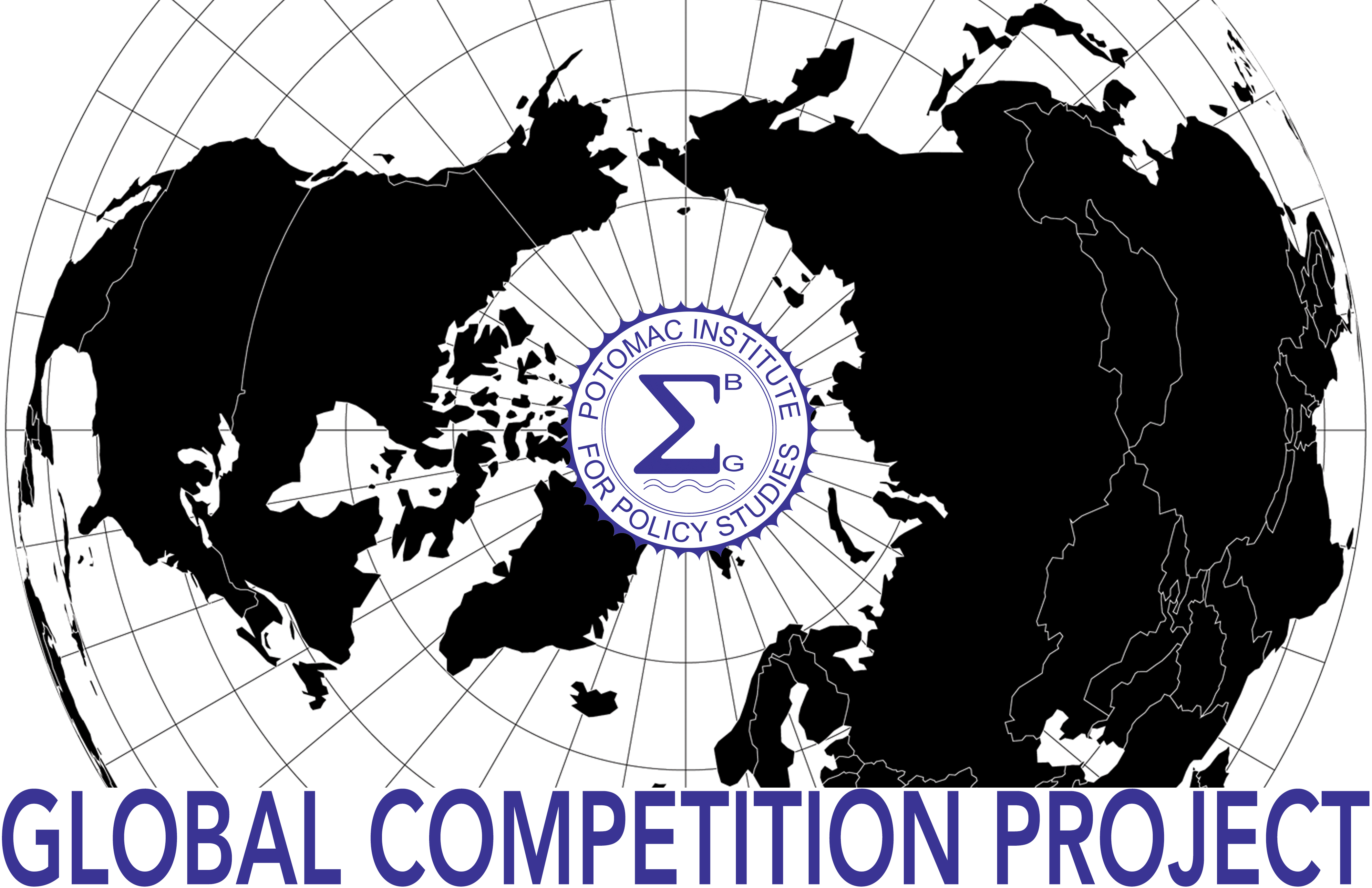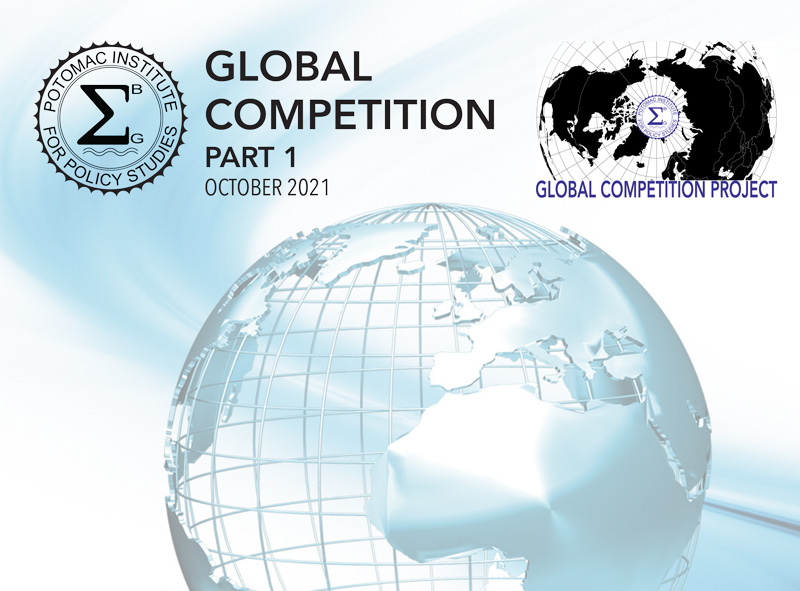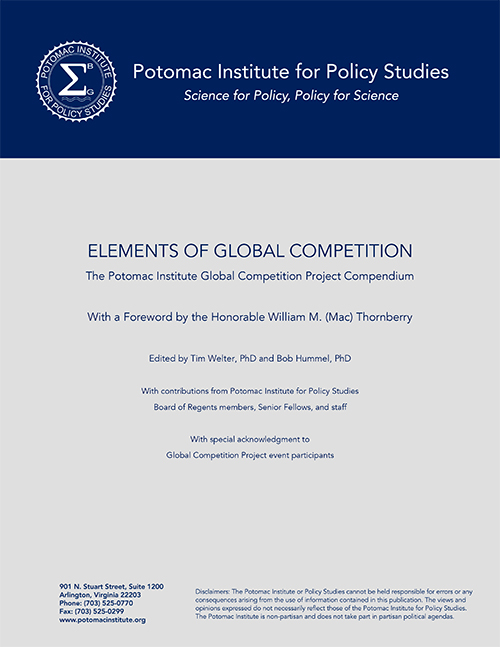Global Competition Project (GCP)
Global Competition Project (GCP)
About The Global Competition Project (GCP)
The Project was launched to explore what the United States must do to continue to thrive as a global leader, economically and otherwise, driving toward a societal-level understanding and approach to competition at the intersection of policy, industry, and science and technology.
To do so, the Project is commissioning a spectrum of experts from diverse fields across the Potomac Institute’s network and beyond. Their purpose is to highlight and elevate issues surrounding both the challenges and opportunities associated with societal-level competition today and in the future. What are the greatest vulnerabilities to consider? What is at stake for the United States? How do we best leverage our strengths?
Ultimately, the Project’s goal is to develop foundational reference products (through research, discussion, events, and papers, etc.) for national security professionals, policymakers, industry leaders, and others to use in addressing the most consequential aspects of near-peer competition.
A New Genre of Competition: Society-level engagement in the Information Age
For the United States to continue to thrive as a global leader, economically and otherwise, a societal-level understanding and approach to competition must be invigorated. The issue is a multifaceted, multigenerational challenge just in its infancy of being recognized and addressed and will therefore require priority in the public square and private sector if we are to be successful in years to come.
The current era—the Information Age—is dominated by unprecedented global interconnectedness and economic interdependence, at an all-time high across human history. A single person can wield a megaphone to millions (or billions) via a single social media post. A small ripple in one nation’s markets can result in a tsunami in others and vice versa. Thoughtful and deliberative strategies employed by competitors can therefore be exceedingly effective at swaying minds and money with unprecedented reach, precision, and impact. Unfortunately, examples of such efforts have also devolved into political and economic manipulation and coercion, to include China and Russia as culprits.
While the United States has competed effectively at a societal level before, the stakes and players were different. We did not depend on the Soviet Union economically or otherwise during the Cold War, nor did we depend on Germany or Japan in a similar manner during World War II. Today however, we are economic codependents with China. And China, is deliberately competing with the United States at the societal level, in it for the long-haul, leveraging an enduring patience built over several millennia. While the United States does not “enjoy” the “benefit” and ruthless efficiency of an autocracy in aligning all aspects of society toward strategic goals, American-style democracy and free enterprise have proven themselves repeatedly to be the essential spark for unbridled ingenuity—the key to unrivaled flourishing among the world’s nations.
Our short history has demonstrated that—ingenuity—inventiveness, imagination, and the free flow of ideas, especially when translated to the advance of impactful science and technology (S&T) on the economy, national security, and overall quality of life, is core to our unprecedented success as a country. This time is no different, especially when S&T is complimented by sound policy and an engaged private sector. The intersection of all three, illuminated via the compilation of insight gathered from a diverse field of experts, will provide a vital tool to understanding and developing a coherent society-level approach to competition in the Information Age.
Global Competition Project April 25, 2022
Dr. Tim Welter led a panel consisting of Mr. Frank Fannon (Former Assistant Secretary of State, Energy Resources, Managing Director at Fannon Global Advisors, Senior Advisor [Non- Resident] at CSIS, Senior Fellow[Non-Resident] at Atlantic Council), Mr. Ron Nussle Jr. (Former Senior Advisor to the Under Secretary of State,President/COO of New Hope Energy), and Ms. Gentry Lane (CEO and Founder of ANOVA Intelligence,Technical Team Member at the NATO S&T Organization, Senior Fellow [Non-Resident] at Potomac Institute). As part of its Global Competition Project, the Potomac Institute is commissioning a spectrum of experts to help address the most vexing challenges associated with near-peer competition; developing foundational references to help guide government and industry leaders, and DoD officials, to best serve the nation’s future. This panel focused on the U.S. energy sector, related technologies, resources, infrastructure, and policy, as they pertain to America’s competitive advantage on the world stage.
Read more: Energy Advantage – the Cornerstone of 21st Century Security and Prosperity
March 30, 2022
Dr. Tim Welter co-chaired the event’s panel with Dr. Samantha Weeks (Mission Director, Science & Research for Space X’s Polaris Dawn and Vice President, Corporate Transformation at Shift4 Payment, Retired Air Force Col.). The panel consisted of Dr. Jerry Krassner (Potomac Institute Board of Regents member, co-founder and former National Chairman of MASINT [now ATIA], served as Chief Scientist in several offices at OSD and DIA), and Mr. Thomas Messegee (Spacecraft Design Consultant and Engineer). The conversation focused on the importance of the space domain to global competition and how the U.S. government can compete in that domain amidst increased advancements in space capabilities from geopolitical rivals (Russia, China) and the commercial sector. Dr. Tim Welter, and Dr. Jen Buss delivered introductory remarks.
Read more: Global Competition Project:Envisioning Competitive Advantage in the Space Domain.
February 24th, 2022
Dr. Tim Welter led a panel consisting of the Honorable Zach J. Lemnios (Former Vice President of IBM Research, Potomac Institute Board of Regents Member), Dr. Will Roper (Former Assistant Secretary of Air Force Acquisition, Technology & Logistics), and Ms. Lois Nicholson (Counsellor Defense Acquisition and Technology at the British Embassy in Washington, D.C.). The subject of the conversation was focused on economics and the spectrum of conflict, examining whether the US, and more narrowly, the Department of Defense, is adequately considering the implications of today’s global economic interconnectedness when preparing for war. Dr. Tim Welter, General (ret.) Al Gray, and Dr. Jen Buss delivered introductory remarks.
Read more: Global Competition Project: Economics & the Spectrum of Conflict — Is DoD Prepared?
Summary
News of the Peoples Republic of China’s (PRC) first successful test of a hypersonic missile perforated the headlines in August. The test sent a nuclear-capable hypersonic missile into low-earth orbit around the globe to its target, demonstrating potential to circumvent U.S. missile defense systems and possibly strike North American targets. Media commentary suggested it was a “Sputnik moment” for the PRC, a reference to 1957 when the Soviet Union launched Sputnik 1, the first successful satellite to orbit the earth, signaling that the U.S.’s geopolitical rival achieved a level of technological prowess that effectively challenged its position as a global superpower. Whether the comparison is hyperbole or fact is arguable. However, it is a clear indication matched with other geopolitical and economic signs that the U.S. has a contemporary competitor in the PRC, challenging its position on the world stage, and not just from a security standpoint. As the U.S. gains an appreciation for the emerging competitive environment, the first of many serious questions must be asked: What does it actually mean to compete? What defines competition in this context?
Never in human history has an individual had the ability to communicate with so many others so easily. With technologies like the Internet, personal computers, and smartphones, a powerful reality has emerged: A simple message or piece of information, regardless of its origin or truth, can lend to unraveling the stability and success of a nation. A single posting to social media, can sway millions, if not billions. Indeed, the world is at an inflection point with regard access to and proliferation and manipulation of information at scale.
America’s global competitors have recognized and embraced the opportunities that come with that inflection. They have implemented strategic messaging campaigns to project narratives to help them pursue foreign policy and other national objectives, which include manipulating information to incite political and economic destabilization on the international stage. Examples range from Russia’s use of social media to manipulate the U.S. elections in 2016 and 2020, to the extensive Chinese censorship and disinformation campaigns used to cover up the imprisonment of ethnic minorities in concentration camps, to explaining the disappearance of political dissidents by the state. Each instance represents the shaping of information to influence thoughts and actions via widely available technology platforms; deliberate efforts to drive policy agendas. Strategic communication is a clearly elevated means to gain leverage in today’s globally competitive environment. However, the consequences, to include technological, biological, and psychological aspects of such campaigns and en masse information manipulation, have only just begun to be recognized by the United States.
Read more: GCP Public Event – Strategic Communications & Information in Competition
Upcoming Events
No events foundCOMING SOON:
Hybrid Seminar – GCP: A New Vision for Space
GCP Staff
 Having worked in the private sector, the military, and on Capitol Hill, Tim Welter brings valuable experience in national security and defense policy to the Institute. After serving on active duty in the Air Force for several years, he worked on Capitol Hill as Legislative Director for two different Members of Congress and later as a Professional Staff Member with the House Veterans Affairs Committee. Upon leaving the Hill, Tim worked with the foreign and defense policy research team at the American Enterprise Institute. He later completed a research fellowship at the National War College during which he finished his Ph.D. dissertation in Political Science with the University of Missouri, writing about the political nature of defense policy in Congress. A U.S. Air Force Academy graduate, Tim holds Master’s degrees in Political Science, National Security Strategy, and Management. Just prior to joining the Institute, Tim served at the Pentagon where he helped stand up an organization dedicated to future force design and the development of capabilities and concepts required to meet to emerging national security challenges.
Having worked in the private sector, the military, and on Capitol Hill, Tim Welter brings valuable experience in national security and defense policy to the Institute. After serving on active duty in the Air Force for several years, he worked on Capitol Hill as Legislative Director for two different Members of Congress and later as a Professional Staff Member with the House Veterans Affairs Committee. Upon leaving the Hill, Tim worked with the foreign and defense policy research team at the American Enterprise Institute. He later completed a research fellowship at the National War College during which he finished his Ph.D. dissertation in Political Science with the University of Missouri, writing about the political nature of defense policy in Congress. A U.S. Air Force Academy graduate, Tim holds Master’s degrees in Political Science, National Security Strategy, and Management. Just prior to joining the Institute, Tim served at the Pentagon where he helped stand up an organization dedicated to future force design and the development of capabilities and concepts required to meet to emerging national security challenges.
© 2024 Potomac Institute for Policy Studies




